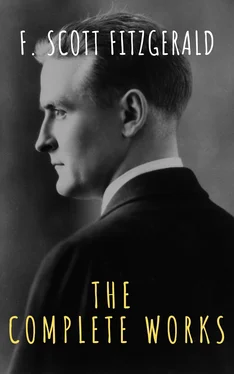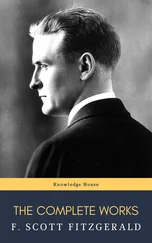Array The griffin classics - The Complete Works of F. Scott Fitzgerald
Здесь есть возможность читать онлайн «Array The griffin classics - The Complete Works of F. Scott Fitzgerald» — ознакомительный отрывок электронной книги совершенно бесплатно, а после прочтения отрывка купить полную версию. В некоторых случаях можно слушать аудио, скачать через торрент в формате fb2 и присутствует краткое содержание. Жанр: unrecognised, на английском языке. Описание произведения, (предисловие) а так же отзывы посетителей доступны на портале библиотеки ЛибКат.
- Название:The Complete Works of F. Scott Fitzgerald
- Автор:
- Жанр:
- Год:неизвестен
- ISBN:нет данных
- Рейтинг книги:5 / 5. Голосов: 1
-
Избранное:Добавить в избранное
- Отзывы:
-
Ваша оценка:
- 100
- 1
- 2
- 3
- 4
- 5
The Complete Works of F. Scott Fitzgerald: краткое содержание, описание и аннотация
Предлагаем к чтению аннотацию, описание, краткое содержание или предисловие (зависит от того, что написал сам автор книги «The Complete Works of F. Scott Fitzgerald»). Если вы не нашли необходимую информацию о книге — напишите в комментариях, мы постараемся отыскать её.
The first table of contents (at the very beginning of the ebook) lists the titles of all novels included in this volume. By clicking on one of those titles you will be redirected to the beginning of that work, where you'll find a new TOC that lists all the chapters and sub-chapters of that specific work.
The Complete Works of F. Scott Fitzgerald — читать онлайн ознакомительный отрывок
Ниже представлен текст книги, разбитый по страницам. Система сохранения места последней прочитанной страницы, позволяет с удобством читать онлайн бесплатно книгу «The Complete Works of F. Scott Fitzgerald», без необходимости каждый раз заново искать на чём Вы остановились. Поставьте закладку, и сможете в любой момент перейти на страницу, на которой закончили чтение.
Интервал:
Закладка:
Moonlight is bright
Kiss me good-night.
What a wonderful song, she thought—everything was wonderful tonight, most of all this romantic scene in the den with their hands clinging and the inevitable looming charmingly close. The future vista of her life seemed an unended succession of scenes like this, under moonlight and pale starlight, and in the backs of warm limousines and in low cosy roadsters stopped under sheltering trees—only the boy might change, and this one was so nice.
“Isabelle!” His whisper blended in the music and they seemed to float nearer together. Her breath came faster. “Can’t I kiss you Isabelle—Isabelle?” Lips half parted, she turned her head to him in the dark. Suddenly the ring of voices, the sound of running footsteps surged toward them. Like a flash Kenneth reached up and turned on the light, and when the door opened and three boys, the wrathy and dance-craving Peter among them, rushed in, he was turning over the magazines on the table, while she sat, without moving, serene and unembarrassed, and even greeted them with a welcoming smile. But her heart was beating wildly and she felt somehow as if she had been deprived.
It was evidently over. There was a clamour for a dance; there was a glance that passed between them, on his side, despair, on hers, regret, and then the evening went on, with the reassured beaux and the eternal cutting-in.
At quarter to twelve Kenneth shook hands with her gravely, in a crowd assembled to wish him good-speed. For an instant he lost his poise, and she felt slightly foolish when a satirical voice from a concealed wit on the edge of the company cried:
“Take her outside, Kenneth!” As he took her hand he pressed it a little and she returned the pressure as she had done to twenty hands that evening—that was all.
At two o’clock upstairs Elaine asked her if she and Kenneth had had a “time” in the den. Isabelle turned to her quietly. In her eyes was the light of the idealist, the inviolate dreamer of Joan-like dreams.
“No!” she answered. “I don’t do that sort of thing anymore—he asked me to but I said ‘No.’”
As she crept into bed she wondered what he’d say in his special delivery tomorrow. He had such a good-looking mouth—would she ever—?
“Fourteen angels were watching over them,” sang Elaine sleepily from the next room.
“Damn!” muttered Isabelle and punched the pillow into a luxurious lump—“Damn!”
— ◆ —
Sentiment—and the Use of Rouge.
Nassau Literary Magazine (June 1917)
I
This story has no moral value. It is about a man who had fought for two years and how he came back to England for two days, and then how he went away again. It is unfortunately one of those stories which must start at the beginning, and the beginning consists merely of a few details. There were two brothers (two sons of Lord Blachford) who sailed to Europe with the first hundred thousand. Lieutenant Richard Harrington Syneforth, the elder, was killed in some forgotten raid; the younger, Lieutenant Clayton Harrington Syneforth, is the hero of this story. He was now a Captain in the Seventeenth Sussex and the immoral thing in the story happens to him. The important part to remember is that when his father met him at Paddington Station and drove him uptown in his motor, he hadn’t been in England for two years—and this was in the early spring of 1917. Various circumstances had brought this about, wounds, advancement, meeting his family in Paris, and mostly being twenty-two and anxious to show his company an example of indefatigable energy. Besides, most of his friends were dead and he had rather a horror of seeing the gaps they’d leave in his England. And here is the story.
He sat at dinner and thought himself rather stupid and unnecessarily moody as his sister’s light chatter amused the table. Lord and Lady Blachford, himself and two unsullied aunts. In the first place he was rather doubtful about his sister’s new manner. She seemed, well, perhaps a bit loud and theatrical; and she was certainly pretty enough not to need so much paint. She couldn’t be more than eighteen, and paint—it seemed so useless. Of course he was used to it in his mother, would have been shocked had she appeared in her unrouged furrowedness, but on Clara it merely accentuated her youth. Altogether he had never seen such obvious paint, and, as they had always been a shockingly frank family, he told her so.
“You’ve got too much stuff on your face.” He tried to speak casually and his sister, nothing wroth, jumped up and ran to a mirror.
“No, I haven’t,” she said, calmly returning.
“I thought,” he continued, rather annoyed, “that the criterion of how much paint to put on was whether men were sure you’d used any or not.”
His sister and mother exchanged glances and both spoke at once.
“Not now, Clay, you know—” began Clara.
“Really, Clay,” interrupted his mother, “you don’t know exactly what the standards are, so you can’t quite criticize. It happens to be a fad to paint a little more.”
Clayton was now rather angry.
“Will all the women at Mrs. Severance’s dance tonight be striped like this?”
Clara’s eyes flashed.
“Yes!”
“Then I don’t believe I care to go.”
Clara, about to flare up, caught her mother’s eye and was silent.
“Clay, I want you to go,” said Lady Blachford hastily. “People want to see you before they forget what you look like. And for tonight let’s not talk about war or paint.”
In the end Clay went. A navy subaltern called for his sister at ten and he followed in lonesome state at half-past. After half an hour he had had all he wanted. Frankly, the dance seemed all wrong. He remembered Mrs. Severance’s ante-bellum affairs—staid, correct occasions they were, with only a mere scattering from the faster set, just those people who couldn’t possibly be left out. Now it all was blent, somehow, in one set. His sister had not exaggerated, practically every girl there was painted, over-painted; girls whom he remembered as curate-hunters, holders of long conversations with earnest young men on incense and the validity of orders, girls who had been terrifyingly masculine and had talked about dances as if they were the amusement of the feeble-minded—all were there, trotting through the most extreme steps from over the water. He danced stiffly with many who had delighted his youth, and he found that he wasn’t enjoying himself at all. He found that he had come to picture England as a land of sorrow and asceticism, and while there was little extravagance displayed tonight, he thought that the atmosphere had fallen to that of artificial gaiety rather than risen to a stern calmness. Even under the carved, gilt ceiling of the Severances there was strangely an impression of dance-hall rather than dance. People arrived and departed most informally and, oddly enough, there was a dearth of older people rather than of younger. But there was something in the very faces of the girls, something which was half enthusiasm and half recklessness, that depressed him more than any concrete thing.
When he had decided this and had about made up his mind to go, Eleanor Marbrooke came in. He looked at her keenly. She had not lost, not a bit. He fancied that she had not quite so much paint on as the others, and when he and she talked he felt a social refuge in her cool beauty. Even then he felt that the difference between her and the others was in degree rather than in kind. He stayed, of course, and one o’clock found them sitting apart, watching. There had been a drifting away and now there seemed to be nothing but officers and girls; the Severances themselves seemed out of place as they chattered volubly in a corner to a young couple who looked as if they would rather be left alone.
Читать дальшеИнтервал:
Закладка:
Похожие книги на «The Complete Works of F. Scott Fitzgerald»
Представляем Вашему вниманию похожие книги на «The Complete Works of F. Scott Fitzgerald» списком для выбора. Мы отобрали схожую по названию и смыслу литературу в надежде предоставить читателям больше вариантов отыскать новые, интересные, ещё непрочитанные произведения.
Обсуждение, отзывы о книге «The Complete Works of F. Scott Fitzgerald» и просто собственные мнения читателей. Оставьте ваши комментарии, напишите, что Вы думаете о произведении, его смысле или главных героях. Укажите что конкретно понравилось, а что нет, и почему Вы так считаете.












